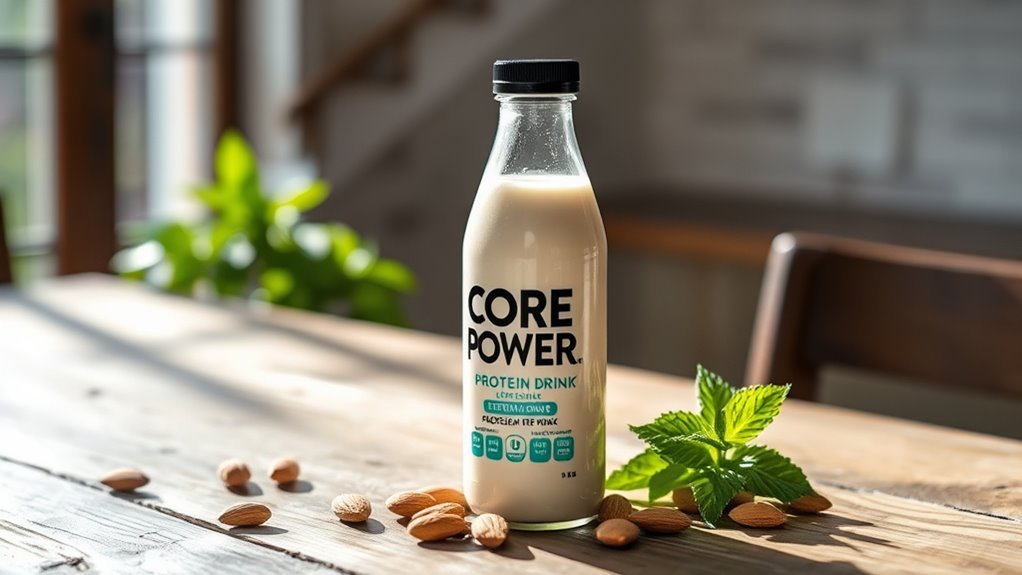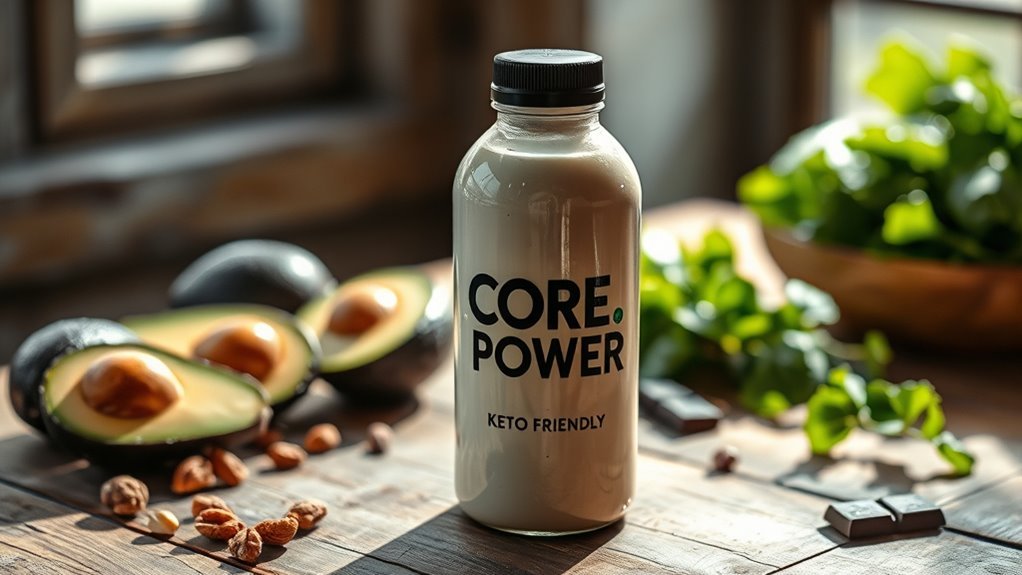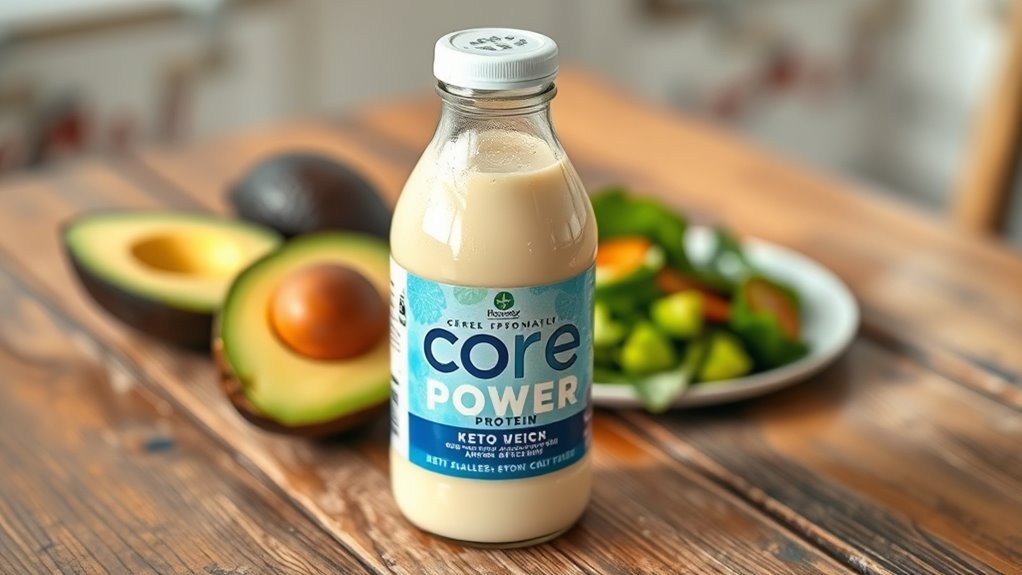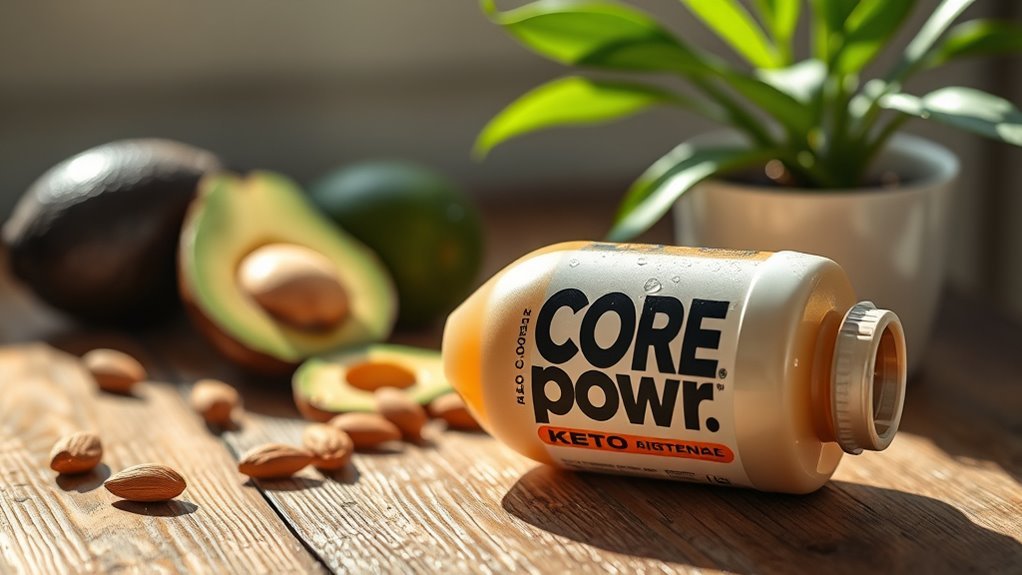Core Power isn’t keto-friendly due to its high carbohydrate and sugar content, with around 26 grams of sugar, primarily from lactose. This amount can exceed daily carb limits on a ketogenic diet, which typically allows for only 20-50 grams of carbs. While it offers protein for muscle recovery, you may want to contemplate low-carb alternatives. If you’re curious about better options and how to maintain a keto-friendly diet, there are plenty of alternatives worth exploring.
Understanding the Ketogenic Diet

What does it really mean to follow a ketogenic diet? At its core, it revolves around the ketogenic principles of drastically reducing carbohydrate intake while increasing fats. By doing this, your body enters a state called ketosis, where it shifts from burning glucose to burning fats for energy. This process, known as fat adaptation, allows your body to efficiently utilize stored fat, promoting weight loss and potentially improving mental clarity. Many people find that embracing these principles grants them a sense of freedom from traditional dietary restrictions. However, it’s essential to understand that achieving and maintaining ketosis requires commitment and precise macronutrient balance. With the right approach, the ketogenic diet can be a powerful tool for those seeking a liberated lifestyle.
Overview of Core Power Ingredients

When evaluating Core Power, it’s crucial to assess its protein sources, sugar content, and carbohydrate profile. These factors greatly influence whether this drink aligns with your keto goals. By analyzing these ingredients, you can make a more informed decision about incorporating Core Power into your diet.
Protein Source Analysis
While many protein drinks prioritize a single source of protein, Core Power offers a blend that includes both whey and casein proteins. This combination enhances protein quality, as whey provides a rapid release of amino acids, making it ideal for post-workout recovery. Casein, on the other hand, digests more slowly, providing a sustained release of amino acids, which can be beneficial for muscle repair over an extended period. By incorporating both types, Core Power caters to various needs, allowing you to optimize your protein intake effectively. This dual approach not only supports muscle growth but also helps in maintaining satiety, aligning with your desire for a balanced and fulfilling diet while adhering to keto principles.
Sugar Content Examination
Core Power’s ingredient list reveals important insights into its sugar content, which is essential for those following a keto diet. You’ll notice that it contains sugar, but also includes sugar substitutes and keto sweeteners, which can be beneficial for maintaining your carbohydrate intake. While the presence of natural sugars may raise some red flags, Core Power strategically incorporates alternatives that can help satisfy your sweet tooth without derailing your dietary goals. These sugar substitutes can provide a way to enjoy flavor while keeping your daily carb count in check. Ultimately, understanding these ingredients allows you to make informed choices, ensuring that your nutritional freedom aligns with your keto lifestyle.
Carb Profile Breakdown
Understanding the carbohydrate profile of Core Power is vital for anyone on a keto diet. This protein drink contains a blend of carb sources, primarily from milk and added sugars. Each serving typically has around 26 grams of carbohydrates, which can greatly impact your daily carb limit on keto. For those seeking keto benefits, it’s important to be mindful of how these carbs fit into your overall intake. While Core Power provides protein and electrolytes, the carb count might not align with your keto goals. If you’re committed to maintaining ketosis, consider alternatives with lower carb profiles that still offer necessary nutrients without compromising your dietary freedom. Always read labels carefully to make informed choices that support your lifestyle.
Nutritional Profile of Core Power

The nutritional profile of Core Power reveals a blend of protein, carbohydrates, and fats designed to support recovery and muscle maintenance. You’ll find that it typically contains around 26 grams of protein, which is essential for muscle repair, along with a balance of carbohydrates for energy replenishment. This mix caters well to those aiming for nutritional balance after workouts. However, if you have specific dietary restrictions, such as being on a ketogenic diet, you’ll need to take into account the overall carb content. Core Power’s formulation may not align with strict keto guidelines, but it does offer a convenient option for post-exercise nutrition. Ultimately, evaluating how it fits into your dietary needs is vital for making informed choices.
Carbohydrate Content Analysis
While evaluating Core Power’s suitability for a ketogenic diet, it’s crucial to examine its carbohydrate content closely. Core Power contains various carbohydrate sources, primarily derived from milk and added sugars. This can be a concern for those adhering to strict keto guidelines, which typically recommend limiting daily carb intake to around 20-50 grams. Depending on your overall meal plan, the carbohydrate content in Core Power could take up a significant portion of your daily allowance. If you’re mindful of your macros and are looking for a keto-friendly option, it’s important to assess how Core Power fits into your overall carbohydrate limit. Ultimately, understanding its carbohydrate profile will empower you to make informed decisions that align with your dietary goals.
Protein Sources in Core Power
When considering the protein sources in Core Power, you’ll find that they primarily utilize whey protein, which is known for its high biological value and quick absorption. This protein type can greatly contribute to muscle repair and growth, making it a popular choice among fitness enthusiasts. Analyzing the nutritional breakdown reveals how these protein sources align with your dietary goals, especially if you’re aiming for a keto-friendly option.
Protein Type Analysis
Understanding the protein sources in Core Power can help you determine if it aligns with your keto-friendly goals. Core Power primarily uses whey protein, known for its high protein quality and rich amino acid profile. This fast-digesting protein supports muscle recovery and offers essential amino acids that your body needs, particularly after exercise. Since the ketogenic diet emphasizes protein intake while limiting carbs, the inclusion of whey protein can be beneficial. However, remember that Core Power also contains sugars, which may not align with strict keto guidelines. Evaluating the protein quality and the presence of essential amino acids in Core Power allows you to make an informed decision about whether it fits your lifestyle and dietary aspirations.
Nutritional Breakdown Overview
Evaluating the nutritional breakdown of Core Power reveals important details about its overall compatibility with a keto diet. Core Power primarily features whey protein, which offers significant nutritional benefits, including essential amino acids that support muscle recovery and growth. Each serving typically contains around 26 grams of protein while maintaining a moderate carbohydrate content, which may pose dietary considerations for those strictly adhering to keto. While the protein content aligns well with keto principles, the sugar content from added flavors can potentially disrupt ketosis. Consequently, if you’re considering Core Power as a post-workout option, it’s vital to balance it with your daily carb intake to maintain your ketogenic goals. Always check the label to make informed choices that align with your dietary needs.
Sugar Content and Its Impact on Keto
Sugar content plays an essential role in determining whether a product is keto-friendly. For those following a ketogenic diet, keeping carbohydrate intake low is vital, as excessive sugar can disrupt ketosis. Many keto snacks utilize sugar substitutes like erythritol or stevia, which provide sweetness without the carbs that traditional sugars contain. When considering a drink like Core Power, you’ll want to evaluate its sugar content against your daily carb limits. If it contains high levels of sugar, it could hinder your keto progress. Always check labels for total sugars and be aware of how they fit into your overall macros. By choosing products with low or no sugar, you can enjoy your keto journey while savoring the freedom to indulge in tasty options.
Flavor Variations and Their Nutritional Differences
How do the flavor variations of Core Power stack up nutritionally? Each flavor profile offers distinct nutritional variations that can impact your keto journey. For instance, the chocolate flavor tends to have a slightly higher sugar content compared to vanilla, which might concern those watching their carb intake. However, both options provide essential protein and beneficial nutrients, keeping you fueled post-workout. If you prefer fruity flavors, they often include added sugars that can push your carb count higher. It’s vital to scrutinize the nutritional labels to guarantee you’re aligning your choices with your keto goals. Ultimately, understanding these differences empowers you to make informed decisions that fit your lifestyle while enjoying the diverse tastes Core Power has to offer.
Comparing Core Power to Other Protein Drinks
When you’re choosing a protein drink, comparing Core Power to other options can reveal important differences in nutritional profiles. You’ll want to look closely at the ingredients and sugar content, as these factors can greatly impact your health goals. By analyzing these elements, you can make a more informed decision that aligns with your dietary needs.
Nutritional Profile Analysis
While many protein drinks promise a quick boost in nutrition, analyzing the nutritional profile of Core Power in comparison to other options reveals significant differences that can impact your dietary choices. Core Power offers a balanced ratio of protein, carbohydrates, and fats, delivering substantial nutritional benefits. Unlike some alternatives that may perpetuate keto misconceptions, Core Power contains a moderate carb content, making it less suitable for strict ketogenic diets. When comparing with other protein drinks, it stands out for its natural ingredients and higher protein quality. This can be essential for those seeking to maintain energy levels without compromising their diet. Ultimately, understanding these distinctions enables you to make informed choices that align with your nutritional goals.
Ingredients Comparison
Although many protein drinks boast similar benefits, a closer look at the ingredients in Core Power reveals key differences that can affect your dietary choices. The ingredient sourcing matters—Core Power emphasizes high-quality proteins from real milk, unlike some competitors that use synthetic blends. Pay attention to nutritional labeling; it’s essential for making informed decisions.
- Real ingredients versus artificial additives
- Transparent sourcing for peace of mind
- Higher protein content per serving
- Fewer fillers and preservatives
These factors can greatly impact your health and fitness journey. By choosing Core Power, you’re opting for a product that prioritizes quality and transparency, empowering you to take control of your nutritional intake without compromising on taste or effectiveness.
Sugar Content Differences
Understanding the sugar content in protein drinks is essential for anyone looking to maintain a keto-friendly diet. Core Power contains about 26 grams of sugar, primarily from lactose, which can be a concern for strict keto dieters. In contrast, many other protein drinks utilize sugar substitutes or natural sweeteners like stevia or erythritol, which help keep sugar levels low while maintaining flavor. These alternatives can greatly reduce the overall carbohydrate content, making them more compatible with a ketogenic lifestyle. When comparing options, look for products that prioritize low sugar and incorporate healthier sweeteners. You want to guarantee your protein intake aligns with your dietary goals without compromising on taste or quality.
When to Use Core Power on a Keto Diet
When should you reach for Core Power on a keto diet? Timing is essential for maximizing its benefits. Consider using it primarily for:
- Post workout nutrition: Your body craves protein after exercise to support muscle recovery.
- Keto meal timing: Use it as a bridge between meals to maintain energy levels.
- Quick refueling: When you’re on-the-go, it offers a convenient source of sustenance.
- Snack alternatives: Instead of reaching for high-carb snacks, this can satisfy your hunger without derailing your keto goals.
Incorporating Core Power at these moments can help you stay aligned with your keto lifestyle, allowing you the freedom to enjoy your fitness journey while nourishing your body effectively.
Alternatives to Core Power for Keto Enthusiasts
If you’re looking for alternatives to Core Power that align with your keto goals, there are several options to contemplate that can provide similar benefits without the carbs. Consider low carb smoothies made with unsweetened almond milk, spinach, and a scoop of protein powder. These can keep you energized while staying within your macro limits. Additionally, keto snacks like cheese crisps or beef jerky offer a protein boost without the excess carbs found in traditional sports drinks. For a revitalizing option, try coconut water with added electrolytes—just verify it fits your carb count. Exploring these alternatives not only supports your keto lifestyle but also gives you the freedom to enjoy delicious and nutritious beverages and snacks.
Frequently Asked Questions
Can Core Power Be Consumed During Intermittent Fasting?
When it comes to intermittent fasting, you’ve got to tread carefully. While you might think sipping on Core Power could be harmless, it can break your fast due to its calorie content. Intermittent fasting is all about maximizing fasting benefits, like improved metabolism and fat loss. If you’re aiming for those perks, it’s best to stick to water or black coffee. In the long run, that’ll keep you on the right path.
Does Core Power Contain Any Artificial Sweeteners?
When you’re looking at Core Power, you might wonder if it contains any artificial sweeteners. Generally, it’s formulated without artificial ingredients, relying instead on sweetener alternatives that are more natural. This choice aligns with a trend towards cleaner nutrition, appealing to those who prioritize what they consume. Always check the label for specific details, as formulations can vary, but you can often find options that meet your preferences for natural ingredients.
Is Core Power Suitable for Dairy-Free Diets?
When it comes to managing dietary needs, you’ve gotta know what’s in your corner. Core Power isn’t suitable for dairy-free diets, as it contains milk protein. If you’re seeking dairy alternatives, consider plant-based protein sources like pea or almond protein. They can provide similar benefits without the dairy. Always check labels for hidden ingredients, ensuring you stay true to your dietary preferences while still fueling your body effectively.
How Does Core Power Affect Ketosis Levels?
When considering how Core Power affects ketosis levels, it’s essential to look at its protein content and carbohydrate makeup. Since maintaining ketosis relies on low carb intake, high-protein beverages can impact your state of ketosis. Core Power contains sugars that may hinder your ability to stay in ketosis, depending on your overall diet. If you’re aiming for a strict ketogenic lifestyle, monitoring these factors will help you make informed choices about your intake.
Can Core Power Be Used as a Meal Replacement?
Core Power can be considered for meal replacement, but its effectiveness depends on your nutritional needs. A nutritional content analysis reveals it offers protein and some carbs, which might not fully satisfy your energy requirements for a complete meal. If you’re looking for a quick option, it can work temporarily, but for long-term meal replacement, make certain you’re meeting your overall dietary goals. Balance is key, so you might want to complement it with other nutrients.
Frequently Asked Questions about Core Power and Keto
1. Is Core Power a keto-friendly protein drink?
Core Power is not typically considered keto-friendly due to its carbohydrate content. Most keto diets require a significant reduction in carbohydrate intake, and while Core Power offers protein and essential nutrients, it contains around 14 grams of carbohydrates per serving, which may exceed the daily carb limit for those on a strict ketogenic diet. It’s advisable to check individual nutritional goals and perhaps consider lower-carb alternatives.
2. What are the nutritional components of Core Power?
Core Power typically contains protein, carbohydrates, sugars, and fats. A standard serving offers about 26 grams of protein, which is beneficial for muscle recovery, especially after workouts. It also includes 14 grams of carbohydrates and approximately 6 grams of sugar. Understanding these components is crucial for those on a keto diet, which prioritizes higher fat and lower carbohydrate intake.
3. Can I incorporate Core Power into a low-carb diet?
While Core Power may not fit into a strict ketogenic diet, it can potentially be included in a low-carb diet depending on your specific carbohydrate allowances. If your low-carb diet allows for some carbohydrates, you might enjoy Core Power as a post-workout recovery drink. However, it’s essential to monitor your overall daily carb intake to ensure you stay within your limits.
4. What are some keto-friendly alternatives to Core Power?
If you’re looking for keto-friendly alternatives to Core Power, consider options like protein powders with low or no carbs, such as whey isolate or plant-based protein powders. You can also mix these powders with unsweetened almond milk or coconut milk for a creamy shake without the added carbs. Additionally, consider making homemade protein smoothies with low-carb ingredients like spinach, avocado, and nut butters.
5. Should I consult a dietitian before adding Core Power to my diet?
Yes, consulting a dietitian or nutritionist before incorporating any new product like Core Power into your diet is advisable, especially if you’re following a specific dietary regimen like keto. A professional can help you assess your nutritional needs, provide tailored advice, and ensure that any products you choose align well with your health goals and dietary restrictions.
References
- https://www.ncbi.nlm.nih.gov/pmc/articles/PMC6313440/
- https://www.healthline.com/nutrition/keto-diet-101
- https://www.webmd.com/diet/ss/slideshow-ketogenic-diet
- https://www.mayoclinic.org/healthy-lifestyle/nutrition-and-healthy-eating/expert-answers/keto-diet/faq-20453632
- https://www.hsph.harvard.edu/nutritionsource/keto-diet/


